May 17, 2025 | 05:31 GMT +7
May 17, 2025 | 05:31 GMT +7
Hotline: 0913.378.918
May 17, 2025 | 05:31 GMT +7
Hotline: 0913.378.918
According to statistics from the Ministry of Agriculture and Rural Development, in 2022, the number of female workers in the agricultural sector accounts for 47.4%, especially, cooperative organizations accounting for 80%. This number shows that women have been actively contributing to the development of the agricultural industry. This force not only participates in farming activities but also undertakes many important stages in the value chain from production, and business to product consumption.
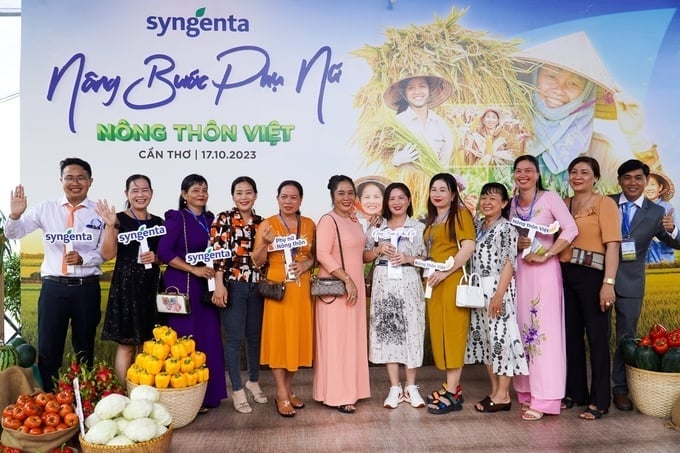
The workshop "Elevating Vietnamese rural women", was held on the occasion of International Rural Women's Day (October 15) and Vietnamese Women's Day (October 20) to recognize the contributions of "the other half" in agricultural development. Photo: Kim Anh.
Despite being the main labour force in the fields, according to a 2021 report by the International Labor Organization (ILO), women do not hold many decision-making positions compared to men.
Furthermore, female workers in rural areas also have few opportunities to participate in training classes and transfer scientific and technical knowledge in farming. This makes this subject susceptible to risks during the production process.
The ILO report shows that the majority of female farmers spend an average of 20.2 hours/week doing housework and taking care of children and families. This time budget is double that of men (about 10.7 hours/week).
Within the framework of the program "Elevating Vietnamese rural women", experts and female farmers discussed and shared knowledge about the present agricultural production, good practices, effective models as well as appropriate nutrition and health care solutions. Equipping with this knowledge creates space for women to learn from experience, proactively make decisions in the production process, and build sustainable livelihoods.
Additionally, the program is an opportunity to recognize the contributions and promote the great potential of rural women in agricultural economic development. Encourage women to apply new technology to farming, increase labour productivity, and improve the quality of agricultural products.
Mr. Tran Thanh Vu, General Director of Syngenta Vietnam, expressed that the above reality is creating disadvantages and challenges for women. Especially in the context of modern agricultural development, requiring the application of a lot of knowledge and new farming technology into production.
The pressure from this "dual" role leaves women in rural areas with little time to rest or exchange experiences to improve their spiritual lives.
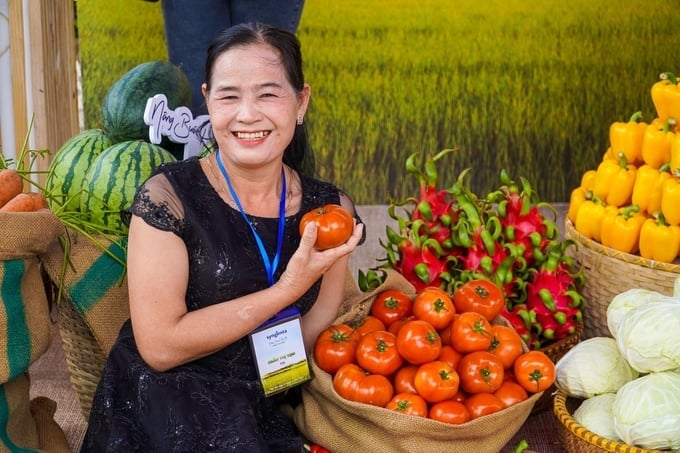
Women have been actively contributing to the development of the agricultural sector, taking on many important stages in the value chain. Photo: Kim Anh.
Sharing this opinion, Ms Tran Thi Thien Thu, Vice President of the Can Tho City Farmers' Association, pointed out some challenges rural women are facing. Due to the mentality of prioritizing family care, there is not much time to participate in economic development. Additionally, some women are not confident enough and forget to take care of themselves.
Ms. Thu affirmed that in recent times, the Party and State have had many policies to support the advancement of Vietnamese women, especially rural women. With the companionship of businesses, many social security and environmental protection activities are implemented, focusing on these vulnerable groups.
Practical experience from international projects related to agricultural and rural development at the farm household level, Associate Professor, Dr. Le Viet Dung, Can Tho University believes that women should change their roles to become economic managers of the family. Because of the current agricultural trend, mechanization is at a high level, in addition to participating in production, women need to confidently join groups and clubs. It is an environment to connect and receive effective information from experts serving agricultural production.
Through the initiative to organize the workshop "Elevating Vietnamese rural women", Syngenta Vietnam has inspired and aroused the desire to learn and work towards high-tech agriculture to improve the lives and income of rural women.
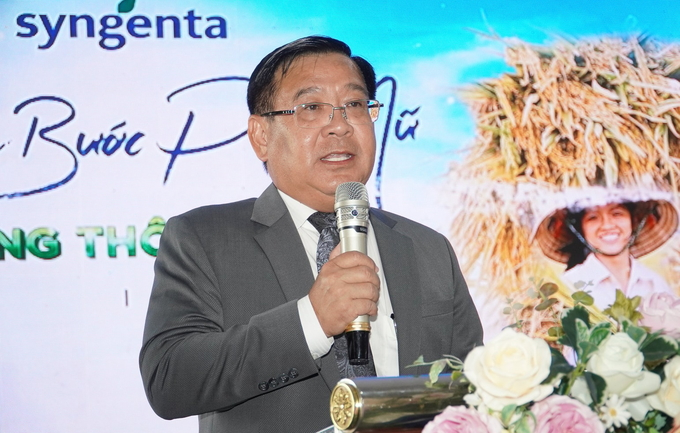
Mr. Tran Thanh Vu, General Director of Syngenta Vietnam recognized the contributions and efforts of rural women in agricultural economic development. Photo: Kim Anh.
Also according to Mr. Tran Thanh Vu, this is the first time the program is held in Vietnam and will continue to be maintained in the following years. Mr. Vu hopes that through the programs, each woman will see her own potential and, together with her family, make important decisions in farming.
As an enterprise associated with the agricultural industry, Syngenta Vietnam is ready to accompany and support "elevating" women in rural areas.
“We support honouring the beauty of Vietnamese female farmers, helping them raise their voice in agricultural production. Syngenta believes that when rural women are firmly on the path to economic independence and family happiness, they can make great contributions to agriculture", Mr. Vu shows the business's commitment to accompanying rural women.
Many women participating in the program were interested and wanted to learn more secrets of success from the story of Ms Tran Thi Van Anh, a young female farmer from Lam Dong province.
Ms. Van Anh has more than 10 years of experience growing potatoes. In the beginning, the growing area was mainly concentrated locally. In 2021, she started expanding in Gia Lai and now the farming area has reached about 50 ha.
Coming from a family with a history of farming, Ms Van Anh actively cultivates her knowledge by regularly participating in seminars and technical training for better agricultural production.
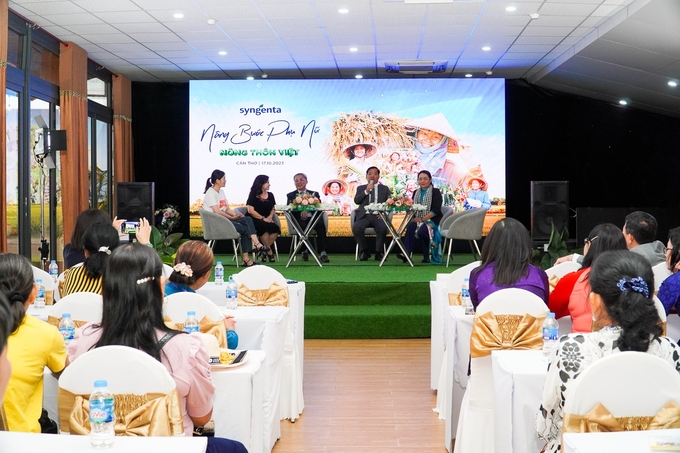
Experts share agricultural knowledge, health, and stories of successful women in agriculture. Photo: Kim Anh.
In addition, women can also participate in activities to experience the company's new agricultural production models at the Syngenta Agricultural Technology Transfer and Development Center in Vinh Long province.
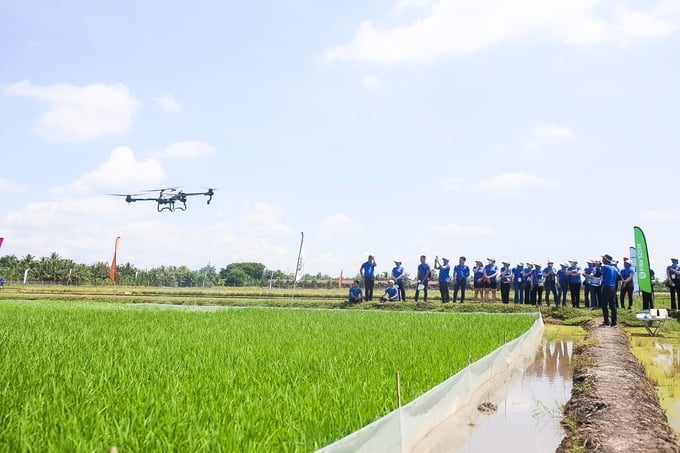
Syngenta Vietnam technical staff guide female farmers about new technology in agricultural production. Photo: Syngenta Vietnam.
Syngenta Vietnam also focuses on raising awareness in taking care of the community, especially vulnerable groups. They aim to help people have the opportunity to access scientific and technical advances and new technology to improve the productivity and quality of agricultural products.
Translated by Hoang Duy
![Multi-channel, multi-directional Vietnamese agricultural markets: [7] Deep processing makes global reach easy](https://t.ex-cdn.com/nongnghiepmoitruong.vn/608w/files/huytd/2025/05/16/2946-che-bien-sau-chia-khoa-vang-nang-tam-nong-san-viet-tren-ban-do-the-gioi-080603_110-093858.jpg)
(VAN) The application of deep processing technology is helping Vietnamese agricultural products enhance their value, create competitive advantages, and open doors to conquer global consumers.
![Multi-channel, multi-directional Vietnamese agricultural markets: [6] Agri products go online](https://t.ex-cdn.com/nongnghiepmoitruong.vn/608w/files/content/2024/12/10/1-113313_954.jpg)
(VAN) Bringing agri products onto e-commerce platforms is an effective way to build a brand that many businesses, cooperatives, and agricultural production households are doing.

(VAN) Veterinary training should focus on quality, not just quantity. Veterinarians also need more options to pursue specialized training.

(VAN) The veterinary industry needs to be viewed objectively and further invested in to properly demonstrate its role and importance in the new context.

(VAN) The number of veterinarians graduating each year is not enough to meet actual needs, hence a difficult problem for the growing livestock industry.

(VAN) The strategic partnership between Cambodia, the Philippines, Vietnam, and CGIAR ensures that innovative solutions effectively address national priorities for food system development.

(VAN) This was affirmed by the UK Minister of State at the Department for Environment, Food and Rural Affairs during a working session with Deputy Minister Tran Thanh Nam on May 13.